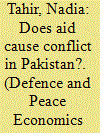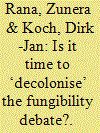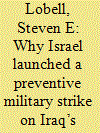|
|
|
Sort Order |
|
|
|
Items / Page
|
|
|
|
|
|
|
| Srl | Item |
| 1 |
ID:
151404


|
|
|
|
|
| Summary/Abstract |
This study provides evidence from Pakistan on how the delegated task of achieving strategic objectives of the donor can lead to incompatibility of aid objectives which then generates perpetual and multidimensional domestic conflict in the recipient society. We use count data method to estimate the relationship between aid and conflict. At the aggregate level, social sector spending, regime change and youth bulge are positively and significantly related with conflict. However, aid per capita gives ambiguous results. It is significant with conflict count in the terrorism data-set and insignificant for data on armed conflict. Inclusion of youth bulge and unemployment rate confirms the marginalization hypothesis of conflict. Inflation rate and the tax variables are insignificant. This confirms that aid erodes fiscal capacity. At project-level data, conflict is strongly related with aid commitment and purpose. Discrepancy in aid allocation and commitment may accentuate conflict.
|
|
|
|
|
|
|
|
|
|
|
|
|
|
|
|
| 2 |
ID:
185081


|
|
|
|
|
| Summary/Abstract |
Taking the Capitol riots of January 6 as a point of departure, this article queries the utility of abject white violence to the US security state through a focus on the latest push for domestic terrorism legislation. Drawing on the first-ever National Strategy for Countering Domestic Terrorism released by the White House in June 2021, we trace how the US security state constructs white supremacist violence as both abject and anachronistic, a creative project of history-making through which the liberal security state operationalizes that violence to bolster and expand US empire and counterinsurgency. Further, we explore how the fungibility of abject whiteness within contemporary US counterterrorism creates a metonymic power by which the foreign and domestic cohere, collapse, and diverge through the figure of the racialized terrorist to suit the needs of the imperial state. While the state’s current push for domestic terrorism legislation publicly portrays a stance of historical reconciliation and multicultural protectionism, the figure of the domestic terrorist functions as a conduit through which the violence of the state is rerouted. Through this vision of besieged multiculturalism, the liberal security state seeks to creatively refashion US empire domestically and at the global scale.
|
|
|
|
|
|
|
|
|
|
|
|
|
|
|
|
| 3 |
ID:
173905


|
|
|
|
|
| Summary/Abstract |
Recent literature has established that development assistance is often fungible and that this is undesirable. In line with current efforts to ‘decolonise development studies’, we critically reflect on the underlying assumptions of this line of thinking. We establish a framework that differentiates between potential positive and negative fungibility. We hypothesise that recipient governments can redirect their own funds and achieve positive fungibility, if (1) the marginal value added in the alternative target sector/region is higher; (2) equity concerns are adequately addressed when other sectors/regions are supported; and (3) temporal delay helps to cushion instability of aid flows. There are indications that this positive fungibility might be quite prevalent. Future fungibility research should therefore no longer assume that fungibility is in itself undesirable.
|
|
|
|
|
|
|
|
|
|
|
|
|
|
|
|
| 4 |
ID:
186559


|
|
|
|
|
| Summary/Abstract |
Prior to the onset of Russia’s invasion of Ukraine, experts predicted an extensive cyber conflict. However, to date the scale of known cyberattacks has been quite modest. Pundits suggest that Ukraine’s improved cyber defenses, which it developed through its close cooperation with Western partners, is one of the possible explanations for Russia’s limited cyber front. This article interrogates this claim, outlining two plausible reasons for the limited effectiveness of Ukraine’s cyber defenses in the Kremlin’s limited cyber front. First, despite an extensive outpouring of cyber knowledge and expertise from the West, Ukraine’s cyber capabilities are still organizationally and operationally underdeveloped. Second, limited fungibility of cyber capabilities complicates interoperability between any joint operations and diminishes the West’s willingness to share their time-limited cyber tools with Ukraine. By explaining the challenges of interstate cooperation in the cyber domain, this article contributes to the literature on the role of alliances in modern warfare.
|
|
|
|
|
|
|
|
|
|
|
|
|
|
|
|
| 5 |
ID:
193162


|
|
|
|
|
| Summary/Abstract |
In 1981, Israel launched a preventive military strike against a nuclear reactor that Iraq was constructing at the Tuwaitha Nuclear Research Center. The low fungibility of Iraq’s power resources, and especially its nuclear weapons program, shaped Israel’s decision-making process. First, it motivated Israel’s executives to disaggregate Iraq’s capabilities. Though they identified Baghdad’s emerging nuclear weapons program as a threat, there was little pressure to act more broadly. Second, it pushed Israel’s leaders to favour delaying strategies to stall Iraq’s program. Third, it motivated Israel’s leaders to favour a preventive military strike to delay Iraq’s nuclear program from becoming more fungible.
|
|
|
|
|
|
|
|
|
|
|
|
|
|
|
|
|
|
|
|
|